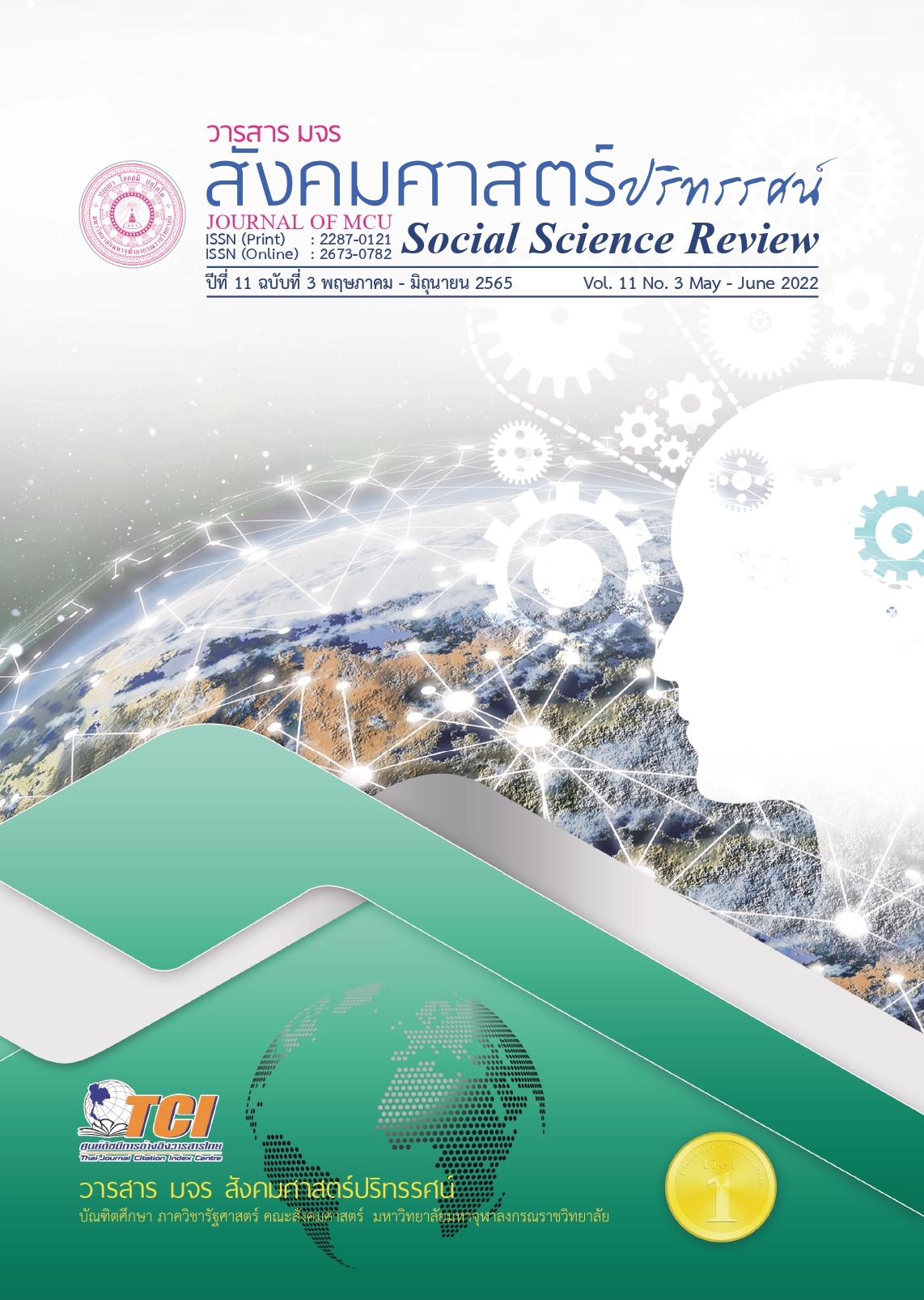ความรู้ความเข้าใจและความสัมพันธ์ของห่วงโซ่อุปทาน การท่องเที่ยวอย่างยั่งยืนในจังหวัดภูเก็ต
คำสำคัญ:
ความรู้ความเข้าใจ, ห่วงโซ่อุปทาน, การท่องเที่ยวอย่างยั่งยืนบทคัดย่อ
บทความวิจัยนี้ มีวัตถุประสงค์เพื่อ 1) เพื่อศึกษาระดับความรู้ความเข้าใจในการการท่องเที่ยวอย่างยั่งยืนของนักท่องเที่ยวชาวต่างชาติในจังหวัดภูเก็ต 2) เพื่อศึกษาระดับความพึงพอใจของปัจจัยต้นน้ำ ปัจจัยกลางน้ำ และปัจจัยปลายน้ำของการท่องเที่ยวอย่างยั่งยืนในจังหวัดภูเก็ต และ 3) เพื่อศึกษาความสัมพันธ์และการถดถอยเชิงพหุของปัจจัยทางด้านต้นน้ำ กลางน้ำ และปลายน้ำในห่วงโซ่อุปทานของการท่องเที่ยวแบบยั่งยืนในจังหวัดภูเก็ต ใช้การวิจัยเชิงปริมาณ เป็นวิจัยเชิงสำรวจ เก็บข้อมูลแบบสอบถามจากนักท่องเที่ยวชาวต่างชาติที่มีต่อการท่องเที่ยวในจังหวัดภูเก็ต กลุ่มตัวอย่างในการศึกษาวิจัยครั้งนี้ จำนวน 400 ราย วิเคราะห์ข้อมูลด้วยการหาค่าสัมประสิทธิ์สหสัมพันธ์แบบเพียร์สัน และการวิเคราะห์การถดถอยเชิงพหุ
ผลการวิจัยพบว่า 1) ความรู้ความเข้าใจเกี่ยวกับการท่องเที่ยวแบบยั่งยืน พบว่า นักท่องเที่ยวชาวต่างชาติมีความรู้อยู่ในระดับมาก 2) ภาพรวมระดับความพึงพอใจของปัจจัยต้นน้ำอยู่ในระดับมาก ปัจจัยกลางน้ำอยู่ในระดับมากที่สุด และปัจจัยปลายน้ำอยู่ในระดับมาก และ 3) ค่าความสัมพันธ์ระหว่างปัจจัยต้นน้ำ กับปัจจัยปลายน้ำ มีความสัมพันธ์เชิงบวกอยู่ในระดับสูง (rxy=.565) การวิเคราะห์ค่าความสัมพันธ์ระหว่างปัจจัยกลางน้ำกับปัจจัยปลายน้ำ มีความสัมพันธ์เชิงบวกอยู่ในระดับสูง (rxy=609) อย่างมีนัยสำคัญทางสถิติ ที่ 0.01
เอกสารอ้างอิง
กัลยา วานิชย์บัญชา. (2544). หลักสถิติ (พิมพ์ครั้งที่ 6). กรุงเทพฯ: โรงพิมพ์แห่งจุฬาลงกรณ์มหาวิทยาลัย.
กฤติยา เกิดผล และปรัชภรณ์ เศรษฐเสถียร. (2560). การพัฒนาระบบบริหารจัดการด้านโลจิสติกส์โซ่อุปทานการท่องเที่ยว ในจังหวัดจันทบุรี. วารสารวิจัยราชมงคลกรุงเทพ, 14(1), 112-124.
ณัฏฐกฤติ นิธิประภา. (2564). บทวิเคราะห์สถานการณ์ MSME สาขาธุรกิจท่องเที่ยวปี 2564 และแนวโน้มปี 2565. ฝ่ายวิเคราะห์สถานการณ์และเตือนภัยทางเศรษฐกิจ สำนักงานส่งเสริมวิสาหกิจขนาดกลางและขนาดย่อม. สืบค้น 30 กันยายน 2564, จากhttps://www.sme.go.th/upload/mod_download/download-20211012232619.pdf
เถกิงศักดิ์ ชัยชาญ. (2556). รายงานการวิจัยการพัฒนาคุณภาพการท่องเที่ยวเชิงนิเวศในภาคตะวันออกเฉียงเหนือ. นครราชสีมา: คลังปัญญา มหาวิทยาลัยเทคโนโลยีสุรนารี.
ทิวาวรรณ ศิริเจริญ กันหา. (2563). แนวทางการพัฒนาการท่องเที่ยวอย่างยั่งยืน กรณีศึกษาชุมชนบ้านห้วยหญ้าเครือ อำเภอน้ำหนาว จังหวัดเพชรบูรณ์. วารสาร วไลยอลงกรณ์ปริทัศน์ มนุษยศาสตร์และสังคมศาสตร์, 10(3), 100-111.
ทัศนีย์ สิราริยกุล. (2560). การจัดการโซ่อุปทานสำหรับการท่องเที่ยวในชุมชนบ้านเชียง จังหวัดอุดรธานี. วารสารรัชต์ภาคย์, 11(24), 101-114.
สมชาย ชมภูน้อย. (2560). แนวทางการเพิ่มมูลค่าท่องเที่ยวชุมชน กรณีศึกษา ชุมชนบ้านเชียง จังหวัดอุดรธานี. สืบค้น 30 กันยายน 2564, จาก http://www.dsdw2016.dsdw.go.th/doc_pr/ndc_2560-2561/PDF/8541e/%E0%B8%A3%E0%B8%A7%E0%B8%A1.pdf
สากล จริยวิทยานนท์. (2542). ระเบียบวิธีวิจัยทางสังคม. กรุงเทพฯ: คณะพัฒนาสังคม สถาบันบัณฑิตพัฒนาบริหารศาสตร์.
สำนักงานจังหวัดภูเก็ต กลุ่มงานยุทธศาสตร์และข้อมูลเพื่อการพัฒนาจังหวัด. (2559). บรรยายสรุปข้อมูลจังหวัดภูเก็ต. สืบค้น 30 กันยายน 2564 จาก https://www.phuket.go.th/webpk/file_data/intropk/dataPK59.pdf
Best J. W. (1981). Research in Education (4th ed.). New Jersey: Prentice Hall Inc.
Cohen, J. (1988). Statistical Power Analysis for the Behavioral Sciences (2nd ed.). Hillsdale, New Jersey: Lawrence Erlbaum Associates Publishers.
Likert, R. (1932). A technique for the measurement of attitudes. Archives of Psychology, 140, 44–53.
ดาวน์โหลด
เผยแพร่แล้ว
รูปแบบการอ้างอิง
ฉบับ
ประเภทบทความ
สัญญาอนุญาต
ลิขสิทธิ์ (c) 2022 วารสาร มจร สังคมศาสตร์ปริทรรศน์

อนุญาตภายใต้เงื่อนไข Creative Commons Attribution-NonCommercial-NoDerivatives 4.0 International License.
เพื่อให้เป็นไปตามกฎหมายลิขสิทธิ์ ผู้นิพนธ์ทุกท่านต้องลงลายมือชื่อในแบบฟอร์มใบมอบลิขสิทธิ์บทความให้แก่วารสารฯ พร้อมกับบทความต้นฉบับที่ได้แก้ไขครั้งสุดท้าย นอกจากนี้ ผู้นิพนธ์ทุกท่านต้องยืนยันว่าบทความต้นฉบับที่ส่งมาตีพิมพ์นั้น ได้ส่งมาตีพิมพ์เฉพาะในวารสาร มจร สังคมศาสตร์ปริทรรศน์ เพียงแห่งเดียวเท่านั้น หากมีการใช้ภาพหรือตารางหรือเนื้อหาอื่นๆ ของผู้นิพนธ์อื่นที่ปรากฏในสิ่งตีพิมพ์อื่นมาแล้ว ผู้นิพนธ์ต้องขออนุญาตเจ้าของลิขสิทธิ์ก่อน พร้อมทั้งแสดงหนังสือที่ได้รับการยินยอมต่อบรรณาธิการ ก่อนที่บทความจะได้รับการตีพิมพ์ หากไม่เป็นไปตามข้อกำหนดเบื้องต้น ทางวารสารจะถอดบทความของท่านออกโดยไม่มีข้อยกเว้นใดๆ ทั้งสิ้น





